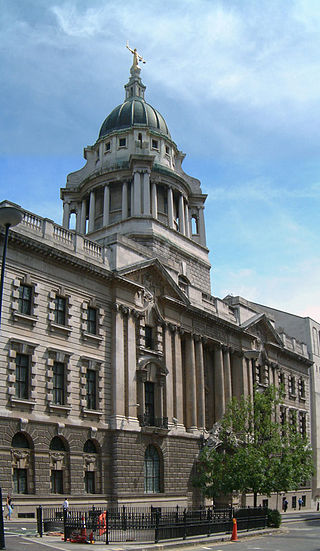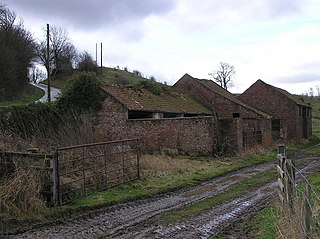
A trust is a legal relationship in which the owner of property, or any transferable right, gives it to another to manage and use solely for the benefit of a designated person. In the English common law, the party who entrusts the property is known as the "settlor", the party to whom it is entrusted is known as the "trustee", the party for whose benefit the property is entrusted is known as the "beneficiary", and the entrusted property is known as the "corpus" or "trust property". A testamentary trust is an irrevocable trust established and funded pursuant to the terms of a deceased person's will. An inter vivos trust is a trust created during the settlor's life.

A fiduciary is a person who holds a legal or ethical relationship of trust with one or more other parties. Typically, a fiduciary prudently takes care of money or other assets for another person. One party, for example, a corporate trust company or the trust department of a bank, acts in a fiduciary capacity to another party, who, for example, has entrusted funds to the fiduciary for safekeeping or investment. Likewise, financial advisers, financial planners, and asset managers, including managers of pension plans, endowments, and other tax-exempt assets, are considered fiduciaries under applicable statutes and laws. In a fiduciary relationship, one person, in a position of vulnerability, justifiably vests confidence, good faith, reliance, and trust in another whose aid, advice, or protection is sought in some matter. In such a relation, good conscience requires the fiduciary to act at all times for the sole benefit and interest of the one who trusts.
A fiduciary is someone who has undertaken to act for and on behalf of another in a particular matter in circumstances which give rise to a relationship of trust and confidence.
The Settled Land Acts were a series of English land law enactments concerning the limits of creating a settlement, a conveyancing device used by a property owner who wants to ensure that provision of future generations of his family.

Bartlett v Barclays Bank Trust Co Ltd [1980] 1 Ch 515 in an English trusts law case. In it Brightman J gave a comprehensive discussion of the duties of trustees in connection with companies whose shares are part of the trust property. Although it is common to hear lawyers refer to "the rule in Bartlett v Barclays Bank", the case only restated law that had been accepted since Speight v Gaunt.

United States trust law is the body of law that regulates the legal instrument for holding wealth known as a trust.

English trust law concerns the protection of assets, usually when they are held by one party for another's benefit. Trusts were a creation of the English law of property and obligations, and share a subsequent history with countries across the Commonwealth and the United States. Trusts developed when claimants in property disputes were dissatisfied with the common law courts and petitioned the King for a just and equitable result. On the King's behalf, the Lord Chancellor developed a parallel justice system in the Court of Chancery, commonly referred as equity. Historically, trusts have mostly been used where people have left money in a will, or created family settlements, charities, or some types of business venture. After the Judicature Act 1873, England's courts of equity and common law were merged, and equitable principles took precedence. Today, trusts play an important role in financial investment, especially in unit trusts and in pension trusts. Although people are generally free to set the terms of trusts in any way they like, there is a growing body of legislation to protect beneficiaries or regulate the trust relationship, including the Trustee Act 1925, Trustee Investments Act 1961, Recognition of Trusts Act 1987, Financial Services and Markets Act 2000, Trustee Act 2000, Pensions Act 1995, Pensions Act 2004 and Charities Act 2011.

Bristol and West Building Society v Mothew [1996] EWCA Civ 533 is a leading English fiduciary law and professional negligence case, concerning a solicitor's duty of care and skill, and the nature of fiduciary duties. The case is globally cited for its definition of a fiduciary and the circumstances in which a fiduciary relationship arises.

Learoyd v Whiteley[1887] UKHL 1 is an English trusts law case, concerning the duty of care owed by a trustee when exercising the power of investment.

The Trustee Act 2000 is an act of the Parliament of the United Kingdom that regulates the duties of trustees in English trust law. Reform in these areas had been advised as early as 1982, and finally came about through the Trustee Bill 2000, based on the Law Commission's 1999 report "Trustees' Powers and Duties", which was introduced to the House of Lords in January 2000. The bill received the Royal Assent on 23 November 2000 and came into force on 1 February 2001 through the Trustee Act 2000 (Commencement) Order 2001, a Statutory Instrument, with the Act having effect over England and Wales.
The Liability of trustees inter se in English law governs in what circumstances and to what extent a trustee in English trust law is liable for the acts and defaults of their co-trustees under English Law. In general trustees are under a duty to act jointly and have authority to act individually only if the trust instrument so provides. In principle therefore each trustee has an equal say in the management of the trust property and therefore in the event of a breach the trustees are jointly and severally liable for their actions.

Re Vandervell Trustees Ltd [1974] EWCA Civ 7 is a leading English trusts law case, concerning resulting trusts.
A trustee de son tort is a person who may be regarded as owing fiduciary duties by a course of conduct that amounts to a wrong, or a tort. Accordingly, a trustee de son tort is not a person who is formally appointed as a trustee, but one who assumes such a role, and then cannot be heard to argue that he did not owe fiduciary duties.

Resulting trusts in English law are trusts created where property is not properly disposed of. It comes from the Latin resultare, meaning to spring back, and was defined by Megarry VC as "essentially a property concept; any property that a man does not effectually dispose of remains his own". These trusts come in two forms: automatic resulting trusts, and presumed resulting trusts. Automatic resulting trusts arise from a "gap" in the equitable title of property. The equitable maxim "equity abhors a vacuum" is followed: it is against principle for a piece of property to have no owner. As such, the courts assign the property to somebody in a resulting trust to avoid this becoming an issue. They occur in one of four situations: where there is no declaration of trust, where an express trust fails, where there is surplus property, or upon the dissolution of an unincorporated association. Rules differ depending on the situation and the type of original trust under dispute; failed charitable trusts, for example, have the property reapplied in a different way from other forms of trust.
Constructive trusts in English law are a form of trust created by the English law courts primarily where the defendant has dealt with property in an "unconscionable manner"—but also in other circumstances. The property is held in "constructive trust" for the harmed party, obliging the defendant to look after it. The main factors that lead to a constructive trust are unconscionable dealings with property, profits from unlawful acts, and unauthorised profits by a fiduciary. Where the owner of a property deals with it in a way that denies or impedes the rights of some other person over that property, the courts may order that owner to hold it in constructive trust. Where someone profits from unlawful acts, such as murder, fraud, or bribery, these profits may also be held in constructive trust. The most common of these is bribery, which requires that the person be in a fiduciary office. Certain offices, such as those of trustee and company director, are always fiduciary offices. Courts may recognise others where the circumstances demand it. Where someone in a fiduciary office makes profits from their duties without the authorisation of that office's beneficiaries, a constructive trust may be imposed on those profits; there is a defence where the beneficiaries have authorised such profits. The justification here is that a person in such an office must avoid conflicts of interest, and be held to account should he fail to do so.

Royal Bank of Scotland plc v Etridge [2001] UKHL 44 is a leading case relevant for English land law and English contract law on the circumstances under which actual and presumed undue influence can be argued to vitiate consent to a contract.

Barclays Bank plc v O’Brien[1993] UKHL 6 is an English contract law case relating to undue influence. It set out the basic categories of undue influence as,

Westdeutsche Landesbank Girozentrale v Islington LBC[1996] UKHL 12, [1996] AC 669 is a leading English trusts law case concerning the circumstances under which a resulting trust arises. It held that such a trust must be intended, or must be able to be presumed to have been intended. In the view of the majority of the House of Lords, presumed intention to reflect what is conscionable underlies all resulting and constructive trusts.
Trusts Act is a stock short title used in Malaysia, New Zealand, Niue, Queensland and the United Kingdom for legislation relating to trusts.

AIB Group (UK) plc v Mark Redler & Co Solicitors [2014] UKSC 58 is an English trust law case, concerning the applicable principles of causation for a breach of trust. It held that a "but for" test of causation applies for equitable compensation.
Undue influence in English law is a field of contract law and property law whereby a transaction may be set aside if it was procured by the influence exerted by one person on another, such that the transaction cannot "fairly be treated the expression of [that person's] free will".












